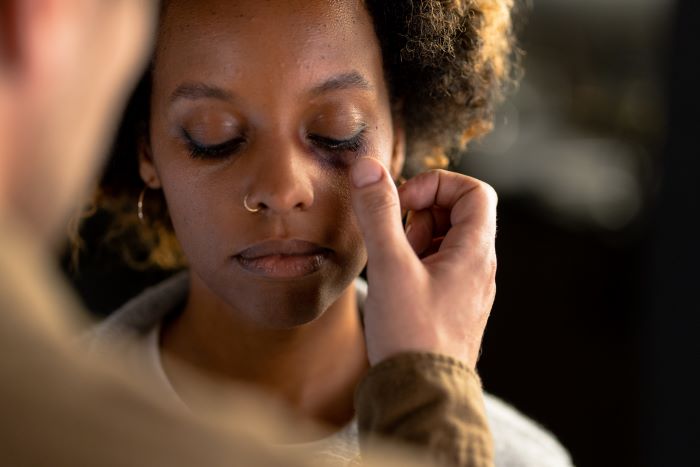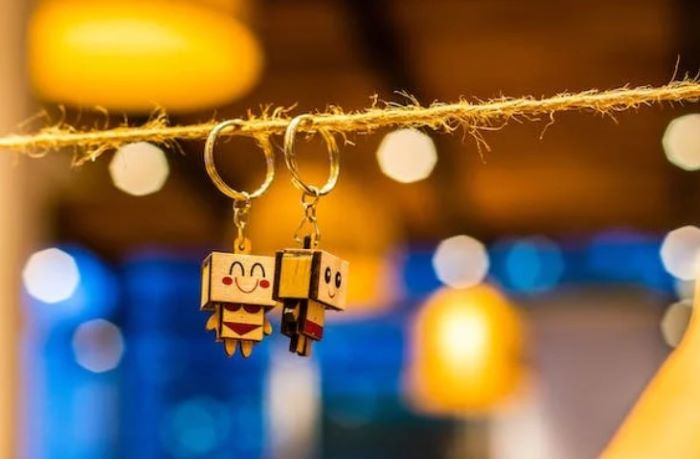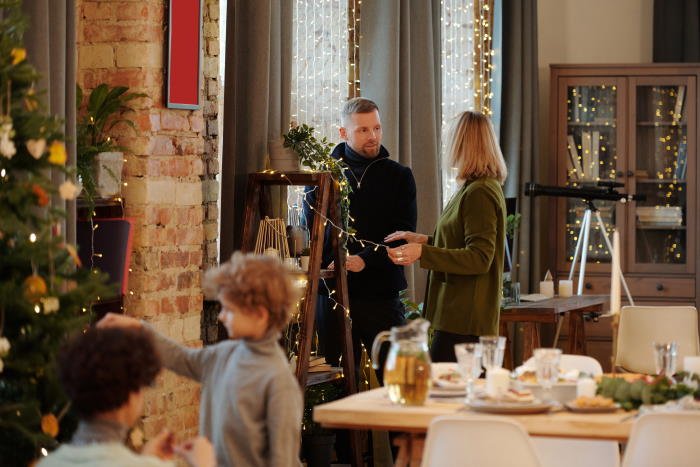
In your marriage or love relationship, your mind wants to protect you from the possibility of abandonment, hurt, or betrayal that you may have experienced from a prior significant relationship. However, your brain is much more likely to keep you alive if it overestimates the links or associations between what is going on in your present life and your past, even as a child. If your brain underestimates the connections with past injuries, you could die. One problem with this advanced survival machine called the brain is that overestimations can often backfire in your current marriage or love relationship, and your partner or spouse may be the unfortunate recipient of past sensitivities that either are not relevant or only minimally connected to the present with your partner or spouse.
All of us have memories that we are not literally aware of, but that our brain does not forget. A part of our brain always remembers events: the hippocampus, a memory center in your right, emotional hemisphere where early memories are formed and associations are stored that you are not aware of. The other part of your brain where memory is stored connected with danger or threats is called the amygdala, located in your right hemisphere, and the emotional source of fear that ties in with your upper-intenstinal area (what many call “butterflies in your stomach”). Memory that is stored in your amygdala includes experiences you are aware of: when I was 4, I touched the stove and burnt myself, so I don’t want to touch a hot stove again.
How Your Brain Affects Your Marriage or Love Relationship
Your brain is an anticipation machine, constantly anticipating what is happening in your current marriage or love relationship based on your past relationships. However, these past associations may not apply to your current relationship, and this could get you into trouble without you even necessarily knowing why.
Neurons that fire together wire together: new experiences can replace the old beliefs
The closer your emotional connection with your partner or spouse, the more likely you are to express openly your sensitivities and vulnerabilities that you are aware of from your past, which dramatically helps your partner or spouse manage your sensitivities and respond with antidotes to your past hurts or betrayals. Every time your partner or spouse gives you the response that you need, your brain learns a new pattern, and neuronal firing occurs in your mind that eventually creates a new neuronal cluster or schema that shapes how you perceive yourself, relationships, and the world. Schemas are highlighted by the creator of schema therapy, Jeffrey Young, in Reinventing Your Life. Every time you reach out and invite your partner or spouse to understand, soothe, comfort, reassure, and validate you, your mind connects these experiences and creates associations that lead to expectations for safety and security in your marriage or love relationship.
How to Truly Live in the Present
Research clearly demonstrates that your early experiences are not nearly as important in shaping your life as how you’ve reflected and “made sense of” those experiences, how you understand your story, so that you’re choosing to put yourself in situations that reinforce healthy beliefs or schemas in your current life. For instance, instead of staying with a partner who is likely to abandon you because he or she is still married and living with his or her spouse, you commit to a partner who is available, able to commit, and lives in proximity to you, even though he or she isn’t perfect (an antidote to the abandonment schema).
If you and your partner or spouse do not have safety and security in your marriage or relationship, you’re much more likely to get stuck in a negative pattern that includes frustration and anger or detachment and withdrawal. The patterns involve negative coping strategies that were once adaptive when you were hurt long ago. However, the same strategies that were so effective can backfire, and reinforce the likelihood that you’ll receive the responses you’re most afraid of from your partner or spouse. These coping strategies are referred to as the “Demon Dialogues” in Hold Me Tight, by Sue Johnson, the creator of Emotionally Focused Therapy, in “Conversation 1.” The negative patterns usually create stronger neuron clusters in the mind that reinforce your worst schemas about yourself, relationships, and the world.
Share Your Experiences
Have you noticed a time when you became emotionally upset in your marriage or love relationship, but didn’t know why your reaction was so strong? re there times when you feel your partner or spouse is having an intense reaction that doesn’t seem to fit the situation he or she is in? Share your experiences and help our community learn from each other. If you find this marriage & couples counseling and therapy in NYC blog helpful, please share it with your partner or spouse, and your friends and family.
Sign up for eTips, our Marriage & Couples Counseling in NYC Newsletter
Enter your information below, and we’ll send up updates on the latest science and trends in couples and marriages.
Privacy Policy:We never share your information with third parties. You may easily unsubscribe at any time.
Author
-

Travis Atkinson, founder of Loving at Your Best Marriage and Couples Counseling, brings three decades of expertise to relationship healing. Mentored by pioneers in schema and emotionally focused therapies, he's revolutionized couples counseling with innovative approaches. Travis's multicultural background informs his unique view of each relationship as its own culture. He combines world-class expertise with genuine compassion to guide couples towards deeper connection.
View all posts
































































Модные советы по созданию необычных видов на каждый день.
Обзоры профессионалов, новости, все новинки и мероприятия.
https://omskdaily.ru/news/2024-09-15-kak-otlichit-originalnuyu-veshch-balmain-ot-poddelki-klyuchevye-priznaki-i-sovety/
I don’t think the title of your article matches the content lol. Just kidding, mainly because I had some doubts after reading the article.
Your point of view caught my eye and was very interesting. Thanks. I have a question for you.
Can you be more specific about the content of your article? After reading it, I still have some doubts. Hope you can help me. https://www.binance.com/cs/join?ref=S5H7X3LP
Thank you for your sharing. I am worried that I lack creative ideas. It is your article that makes me full of hope. Thank you. But, I have a question, can you help me?
I don’t think the title of your article matches the content lol. Just kidding, mainly because I had some doubts after reading the article. https://www.binance.info/en-IN/register?ref=UM6SMJM3
Thanks for sharing. I read many of your blog posts, cool, your blog is very good.
Your point of view caught my eye and was very interesting. Thanks. I have a question for you.
Can you be more specific about the content of your article? After reading it, I still have some doubts. Hope you can help me.
Can you be more specific about the content of your article? After reading it, I still have some doubts. Hope you can help me.
Thank you for your sharing. I am worried that I lack creative ideas. It is your article that makes me full of hope. Thank you. But, I have a question, can you help me?
Поиск в гугле
Can you be more specific about the content of your article? After reading it, I still have some doubts. Hope you can help me.
I don’t think the title of your article matches the content lol. Just kidding, mainly because I had some doubts after reading the article.
На этом сайте вы сможете найти полезную информацию о способах лечения депрессии у пожилых людей. Также здесь представлены методах профилактики, современных подходах и рекомендациях специалистов.
http://leukemia.snubi.org/dokuwiki/doku.php?id=%D0%94%D0%B5%D0%BF%D1%80%D0%B5%D1%81%D1%81%D0%B8%D1%8F%20%D0%BF%D0%BE%D1%81%D0%BB%D0%B5%2070
Can you be more specific about the content of your article? After reading it, I still have some doubts. Hope you can help me.
Your article helped me a lot, is there any more related content? Thanks!
Your point of view caught my eye and was very interesting. Thanks. I have a question for you.
I don’t think the title of your article matches the content lol. Just kidding, mainly because I had some doubts after reading the article.
На данном сайте вы можете приобрести аудиторию для Telegram. Мы предлагаем активные аккаунты, которые помогут продвижению вашего канала. Оперативная накрутка и стабильный прирост обеспечат надежный рост подписчиков. Цены доступные, а оформление заказа максимально прост. Запустите продвижение уже сейчас и нарастите аудиторию своего канала!
Накрутка живых подписчиков в Телеграм канал бесплатно
I don’t think the title of your article matches the content lol. Just kidding, mainly because I had some doubts after reading the article.
Thank you for your sharing. I am worried that I lack creative ideas. It is your article that makes me full of hope. Thank you. But, I have a question, can you help me?
It’s nearly impossible to find knowledgeable people in this particular subject, however, you sound like you know what you’re talking about! Thanks
que eu mesmo criei ou terceirizei, mas parece que
2SeGlkKM2SgHjQUEM3qfzKdmZ8Y
|Hello to all, for the reason that I am actually keen of
Thanks for sharing. I read many of your blog posts, cool, your blog is very good. https://accounts.binance.com/hu/register?ref=FIHEGIZ8
Даркнет — это анонимная часть онлайн-пространства, куда открывается доступ только через защищенные браузеры, например, Tor.
В этой среде размещаются законные , включая магазины и прочие площадки.
Одной из крупнейших платформ была Black Sprut, данный ресурс специализировалась на реализации разнообразной продукции.
https://bs2best
Подобные сайты довольно часто функционируют на анонимные платежи в целях анонимности транзакций.
Однако, власти регулярно ликвидируют популярные даркнет-площадки, однако взамен открываются новые торговые точки.
Our store provides a wide range of high-quality healthcare solutions for different conditions.
Our online pharmacy provides speedy and secure shipping right to your door.
Each medication is sourced from trusted manufacturers for guaranteed safety and quality.
Easily browse our catalog and make a purchase with just a few clicks.
Got any concerns? Customer service is ready to assist you at any time.
Take care of yourself with our trusted e-pharmacy!
https://www.linkcentre.com/review/www.imedix.com/drugs/priligy/
This portal provides access to plenty of online slots, ideal for all types of players.
Here, you can explore classic slots, feature-rich games, and huge-win machines with amazing animations and immersive sound.
If you are into simple gameplay or prefer engaging stories, you’re sure to find a perfect match.
https://obmenka.forum2x2.ru/t18980-topic#41240
All games can be accessed 24/7, right in your browser, and fully optimized for both PC and mobile.
Apart from the machines, the site includes slot guides, bonuses, and user ratings to help you choose.
Join now, spin the reels, and get immersed in the world of digital reels!
Coping with stress requires recognizing its impact and finding healthy strategies. Understanding the physiological effects of chronic stress is enlightening. Learning various stress management techniques like mindfulness or exercise is key. Awareness of whether medical preparations are used for severe stress or anxiety is relevant. Knowing when professional help is needed distinguishes coping from treatment. Finding reliable information on stress reduction supports well-being. The iMedix podcast explores lifestyle factors impacting health, including stress. It functions as a health advice podcast offering coping strategies. Check out the iMedix health podcast for stress management tips. Welcome to iMedix, supporting your mental resilience.
Здесь вам открывается шанс испытать обширной коллекцией слотов.
Слоты обладают живой визуализацией и интерактивным игровым процессом.
Каждый слот предлагает уникальные бонусные раунды, повышающие вероятность победы.
1xbet игровые автоматы
Игра в игровые автоматы предназначена игроков всех уровней.
Можно опробовать игру без ставки, и потом испытать азарт игры на реальные ставки.
Попробуйте свои силы и окунитесь в захватывающий мир слотов.
Thanks for sharing. I read many of your blog posts, cool, your blog is very good.
Your point of view caught my eye and was very interesting. Thanks. I have a question for you.
Your point of view caught my eye and was very interesting. Thanks. I have a question for you.
The site makes available a wide range of pharmaceuticals for home delivery.
Customers are able to easily access needed prescriptions without leaving home.
Our range includes both common solutions and custom orders.
Each item is supplied through trusted suppliers.
https://www.pinterest.com/pin/879609370963950218/
Our focus is on quality and care, with secure payments and on-time dispatch.
Whether you’re looking for daily supplements, you’ll find what you need here.
Begin shopping today and experience reliable support.
I don’t think the title of your article matches the content lol. Just kidding, mainly because I had some doubts after reading the article.